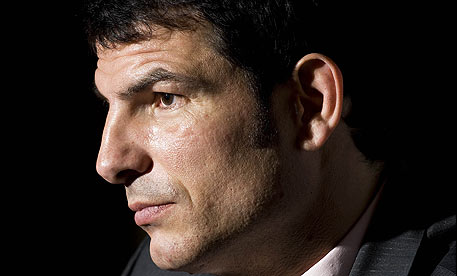
Having said that England and any talk of the grand slam would have to wait until Italy were out of the way, there has been no escape for France this week from either topic. You soon run out of fingers trying to count how many times per sentence France's coach, Marc Lièvremont, and captain, Thierry Dusautoir, refer to the pressure, tension and stress that come with playing against England with everything at stake.
This fixture has a history of strain, one that goes back to the 1990s when Will Carling's England used to wind up Serge Blanco's team into a frenzy on the field, beat them, then patronise them as they walked off. The French refer to it as the "maudit 'Good Game'" on the lips of the English.
France should be able to rise above it all. It took them 44 years to claim a share of the Five Nations title and another five to win it outright for the first time, in 1959 under their forthright then captain, Lucien Mias, and another nine to win their first grand slam, when Pierre Villepreux was their leader, but since then they have been the most successful country. They have taken eight grand slams, four in the professional age and a further two titles (without winning all their matches) since the introduction of Italy in 2000.
But everything is defined by England. Take the grand slams, for example, won in 2002 and 2004. It is difficult to overshadow two unbeaten runs in three years but England managed it, not only winning the one in between, but also crushing France in the semi-final of the 2003 World Cup in Sydney. Imanol Harinordoquy, who, like William Servat and Yannick Jauzion, is still playing, says that he cannot help but "bear a grudge" when it comes to England.
It was even worse in 2007 at the World Cup. They met again in the semi-final, France, fresh from a win in Cardiff over New Zealand, and England, not so fresh, having heaved themselves off their rugby deathbed with a victory over Australia in Marseille. At the Stade de France, England squeezed the life out of France yet again. "That World Cup semi-final defeat still sticks in my throat," says David Marty, who played then alongside Jauzion, as he did last week against Italy, scoring two tries. Today, he sits on the bench, making way for Mathieu Bastareaud.
Since 2007, England have won all three encounters in the Six Nations. They may be viewed in their own land as a troubled team, but in France they are seen as nothing but trouble for French ambitions.
How to play against them now is a preoccupation. For the flanker Julien Bonnaire there is no running away from the physical side of things. "Warming our shoulders" is what he expects his team to be doing. Tackling, that is. The forwards accept the need to be "different" against England. But Clément Poitrenaud, who, as full-back, sees himself as taking the pulse of the team and keeping them out of danger, is wary of going toe to toe with England: "Every time we fall into their game of confrontation we lose."
What France want to be is themselves. Having tinkered with his teams for two years, Lièvremont has built a block of experience around Nicolas Mas, Servat, Lionel Nallet, Harinordoquy, Jauzion and Poitrenaud, and persuaded them to exchange any jaundiced view of England for a reinvented sprightliness against all others. Around this block of seniors he has dotted his youngsters and watched them repay his faith in them.
The most obvious example is Bastareaud, restored after his return in disgrace from New Zealand last summer. Not even Brian O'Driscoll has been able to bring the centre down on the tackler's terms.
Morgan Parra is even more central. Slender and originally from a rugby outpost, the eastern city of Metz in Lorraine, Parra is now France's place-kicker and decision-maker, fitting into the mould of the French scrum-half – Jacques Fouroux or Pierre Berbizier – who wags a finger at players towering over him. And just to assure them that he has the right to treat them this way, he then flies into a tackle and cuts O'Driscoll in half.
Last November, Julien Pierre was recovering from malaria. If he had a place in Lièvremont's thoughts, it was way behind Romain Millo-Chluski, Nallet, Sébastien Chabal and Pascal Papé. But his chance came and the lock has been outstanding.
And nobody could have taken their opportunity better than little Marc Andreu, as he ducked and darted past and through Italian tacklers last week. Ask the wing what he thinks of it all and he replies: "I was out of position a couple of times, made a couple of mistakes in defence and didn't communicate very well." Lièvremont has the players in the perfect mood for a final push.
But this is England. "The only thing they are waiting for is for us to start asking too many questions of ourselves," says Dusautoir. "The only risk is that the high stakes inhibit us," says Lièvremont.
So France begin to worry about the pressure and the tension and the stress of playing against England. Perhaps they should listen to Andreu, their "imp with no hang-ups": "What to expect? Only this, that I'll be coming off the pitch completely drained, having given absolutely everything I have to give." So don't worry. It's only England.

